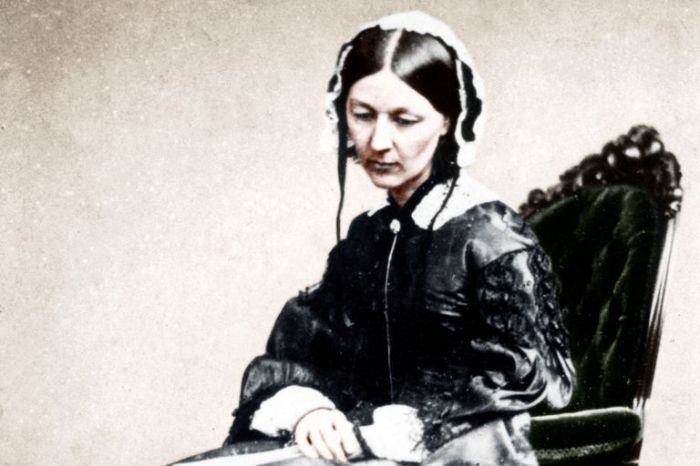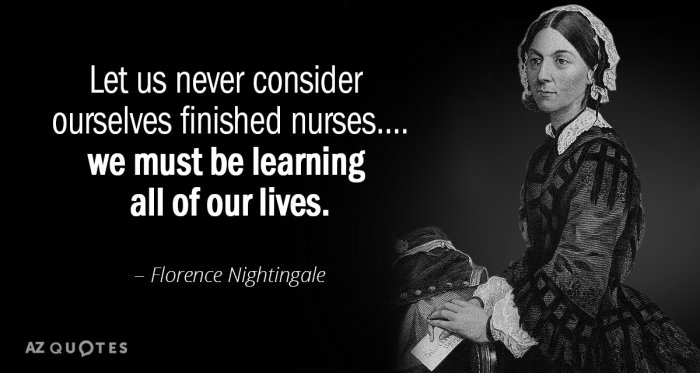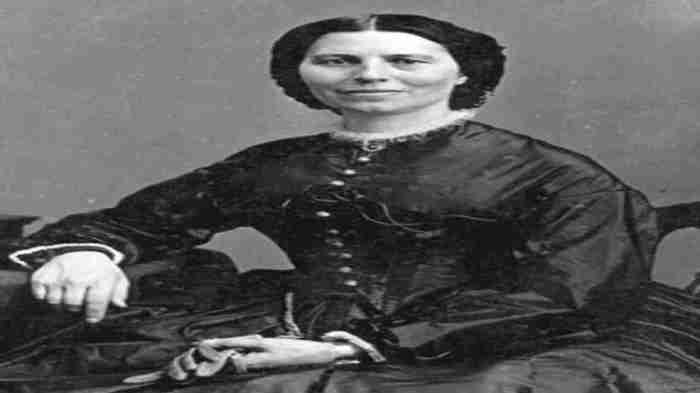Florence Nightingale and Clara Barton, two remarkable women who left an indelible mark on the fields of nursing and humanitarianism, stand as beacons of compassion and innovation. Their groundbreaking contributions shaped the very fabric of healthcare and disaster relief, inspiring generations to come.
Nightingale’s meticulous approach to sanitation and medical reform revolutionized hospital practices, while Barton’s unwavering dedication to providing aid during conflicts and disasters established the American Red Cross as a global force for good. Together, their legacies continue to guide and inspire those dedicated to alleviating suffering and improving the human condition.
Florence Nightingale’s Contributions to Nursing

Florence Nightingale, the “Lady with the Lamp,” revolutionized nursing as a profession and left an indelible mark on healthcare. Her groundbreaking work in hospital sanitation, patient care, and nursing education established the foundation for modern nursing practices.
Nightingale’s most significant contribution was her focus on improving hospital sanitation. Her observations during the Crimean War revealed the appalling conditions in military hospitals, leading her to implement strict hygiene measures that drastically reduced mortality rates. She emphasized the importance of cleanliness, ventilation, and proper nutrition, laying the groundwork for infection control and patient recovery.
Nightingale also reformed nursing education. She established the Nightingale School of Nursing in London, which trained nurses in the principles of sanitation, patient care, and bedside observation. Her curriculum and teaching methods set the standards for nursing education worldwide.
Nightingale’s legacy continues to inspire nurses today. Her principles of sanitation, patient-centered care, and professional development remain fundamental to nursing practice. Her contributions to nursing have improved healthcare outcomes and shaped the profession into what it is today.
Clara Barton’s Humanitarian Efforts

Clara Barton, known as the “Angel of the Battlefield,” was a pioneering humanitarian who dedicated her life to providing aid to those in need. Her unwavering commitment to disaster relief and humanitarian assistance established the foundation for modern humanitarian organizations.
Barton’s most notable accomplishment was the founding of the American Red Cross in 1881. As its first president, she led the organization in providing aid during the Civil War, the Spanish-American War, and numerous natural disasters. Barton’s efforts extended beyond the battlefield, as she also established programs for disaster preparedness, relief, and refugee assistance.
Barton’s advocacy for disaster relief had a profound impact on humanitarian organizations. She emphasized the importance of immediate response, impartiality, and the coordination of relief efforts. Her work paved the way for the development of international humanitarian law and the establishment of disaster relief organizations worldwide.
Barton’s legacy continues to inspire humanitarian workers today. Her unwavering commitment to alleviating suffering, her belief in the power of collaboration, and her advocacy for disaster preparedness remain guiding principles for humanitarian organizations.
Similarities and Differences in Their Approaches

Florence Nightingale and Clara Barton shared a common passion for improving healthcare and alleviating suffering, but their approaches differed significantly. Nightingale focused primarily on improving sanitation and medical reform, while Barton emphasized humanitarian aid and disaster relief.
Nightingale’s approach was grounded in scientific principles and data. She meticulously collected and analyzed data on hospital conditions and mortality rates, which informed her reforms. Barton’s approach, on the other hand, was more pragmatic and intuitive. She relied on her personal experiences and observations to identify and address the needs of those affected by war and disaster.
Despite their differences, Nightingale and Barton shared a deep commitment to improving the lives of others. Their unwavering dedication, their ability to mobilize resources, and their belief in the power of compassion and collaboration continue to inspire healthcare professionals and humanitarian workers today.
Legacy and Impact
Florence Nightingale and Clara Barton left an indelible mark on nursing and humanitarian work. Their contributions have had a lasting impact on healthcare practices, disaster relief, and the development of humanitarian organizations.
Nightingale’s legacy continues to shape nursing education and practice. Her principles of sanitation, patient-centered care, and professional development remain fundamental to nursing worldwide. Barton’s legacy is evident in the work of the American Red Cross and other humanitarian organizations that provide aid to those affected by war, natural disasters, and other emergencies.
Over time, the legacies of Nightingale and Barton have evolved to reflect the changing needs of healthcare and humanitarian work. Nightingale’s focus on sanitation and infection control has been expanded to include a broader understanding of public health and disease prevention.
Barton’s emphasis on disaster relief has evolved to include a focus on disaster preparedness, community resilience, and long-term recovery.
The legacies of Florence Nightingale and Clara Barton continue to inspire and guide healthcare professionals and humanitarian workers today. Their unwavering dedication to improving the lives of others, their ability to mobilize resources, and their belief in the power of compassion and collaboration serve as a testament to the enduring impact of their contributions.
HTML Table: Florence Nightingale And Clara Barton
| Role | Key Accomplishments | Impact |
|---|---|---|
| Florence Nightingale | – Established nursing as a profession
|
– Improved healthcare outcomes
|
| Clara Barton | – Founded the American Red Cross
|
– Established the principles of humanitarian aid
|
List of Bullet Points: Nightingale’s Nursing Philosophy
- Sanitation and Hygiene:Emphasis on cleanliness, ventilation, and proper nutrition to prevent infection.
- Patient-Centered Care:Respect for the patient’s dignity and individual needs, including psychological well-being.
- Professional Development:Education and training for nurses to enhance their skills and knowledge.
- Data Collection and Analysis:Use of data to inform decision-making and improve patient outcomes.
- Observation and Assessment:Nurses should observe and assess patients to identify changes in condition and provide appropriate care.
Essential FAQs
What was Florence Nightingale’s most significant contribution to nursing?
Nightingale’s groundbreaking work in establishing nursing as a profession, reforming hospital sanitation, and introducing innovative patient care practices revolutionized the field of nursing.
How did Clara Barton’s efforts during the Civil War shape the American Red Cross?
Barton’s tireless work providing aid to soldiers on both sides of the conflict led to the establishment of the American Red Cross, which continues to provide humanitarian assistance worldwide.
What were the key similarities and differences in Nightingale’s and Barton’s approaches to healthcare and humanitarianism?
While Nightingale focused on improving sanitation and medical practices, Barton emphasized direct humanitarian aid. However, both shared a passion for alleviating suffering and improving healthcare.